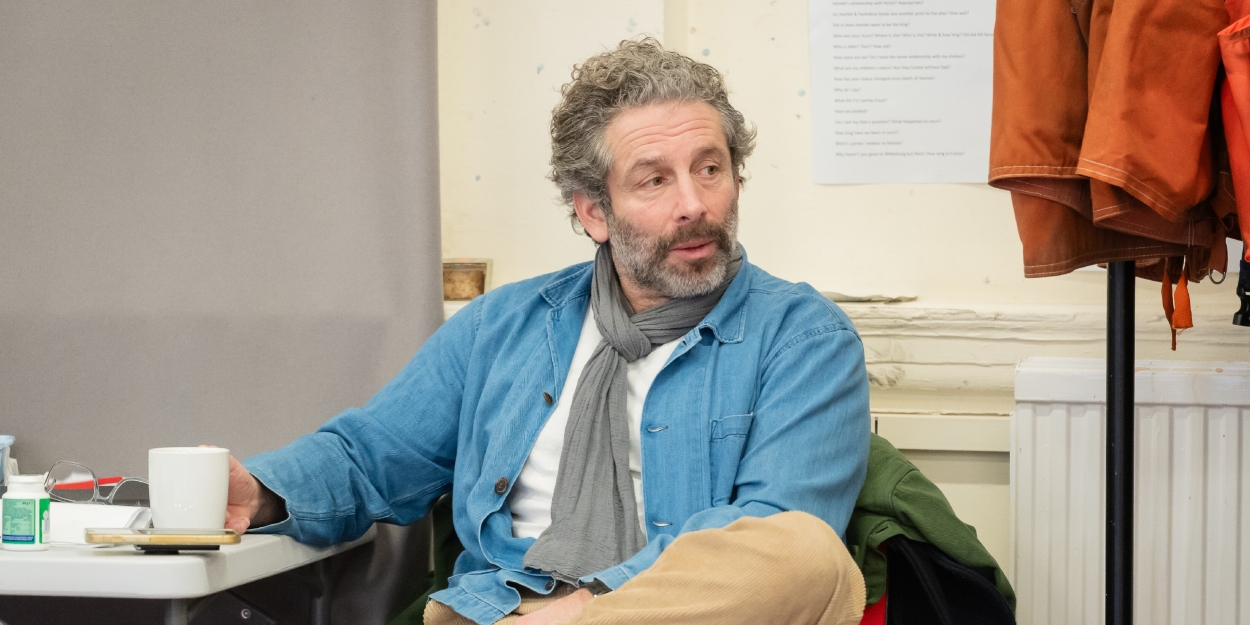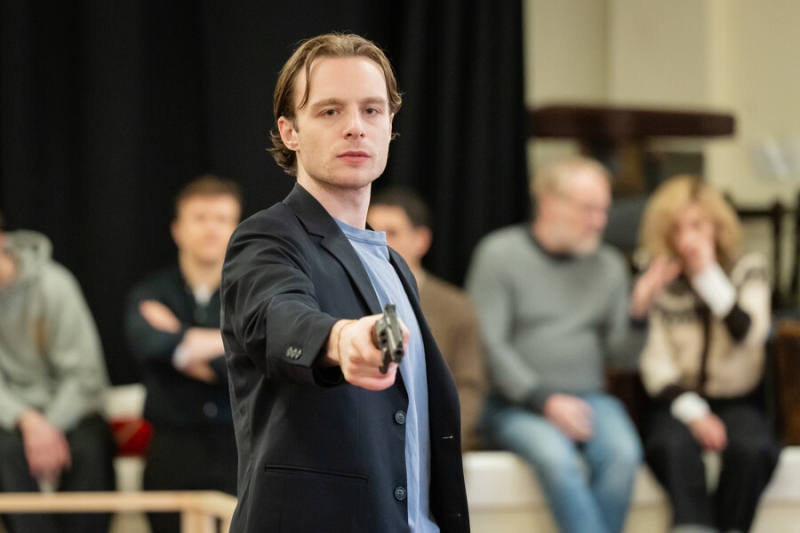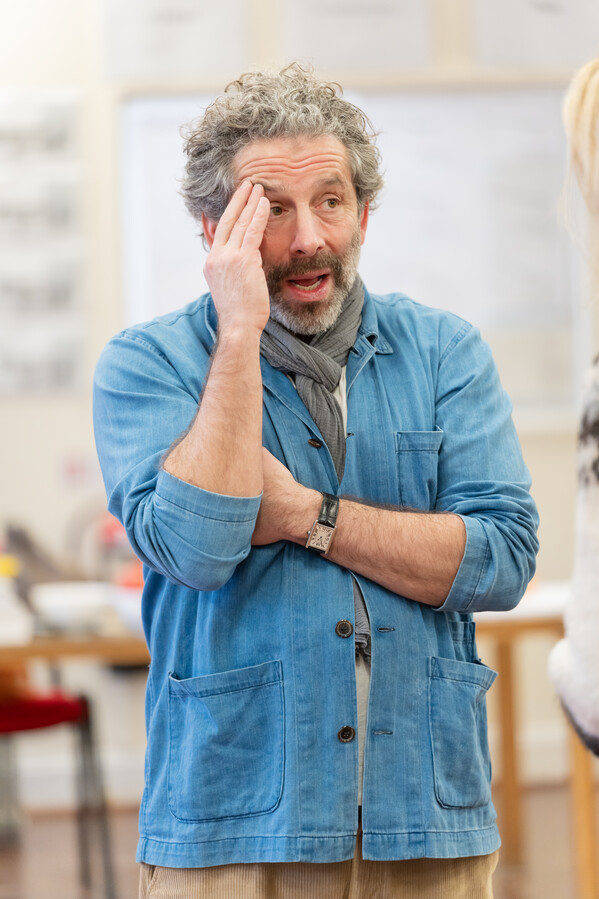Interview: 'It's Irritating To Be Suddenly Old and Wise': Actor Elliot Levey on Playing Polonius in HAMLET
'I feel in my bones that an academic approach to Shakespeare in the rehearsal room is death'

A new production of Hamlet is arriving at the Royal Shakespeare Theatre. Directed by Rupert Goold and starring Luke Thallon in the titular role, the play, which is being described as “high concept,” promises to bring a new take to the iconic story.
Recently, we had the chance to speak with Elliot Levey, who plays Polonius, the father of Ophelia and Laertes. We discussed how Shakespeare has been a part of his acting career since he first auditioned for the National Youth Theatre, how one should treat the work of Shakespeare and how he connects with Polonius as a father himself.
How did you first get started in the world of theatre?
I auditioned as a kid for the NYT - National Youth Theatre. I was at school in Bristol, I saw an advert on the school notice board and it just seemed like a good opportunity to get out of school on a wet Wednesday afternoon. I think I managed to miss rugby or something! And it was really simple. They told you you had to prepare some stuff and I was studying Henry IV for GCSE. And I looked at that famous speech of the King who can't sleep, that speech, and I half-learned that, turned up and got in! I can't remember how it happened, but I got in, and it was a whole new world.
There wasn't really much drama at my school, but for loads of kids that find drama - normally from some great drama teacher or a drama club - suddenly, it's like the light switching on. You don't know at sixteen that you're missing out on something.
I go back to feeling that way, being sixteen or seventeen, all the time in this gig, and it's partly because you're always working with people who are that age. I'm suddenly old - I'm playing bloody Polonius, who's an old man! I know all old people say this, but it's that feeling of the light switch going on. The thing that got me into it in the first place at sixteen is the thing that I'm about to do when I walk into the Royal Shakespeare Theatre for the first time. It's that buzz.
It's interesting that you had a Shakespeare monologue that you did for the NYT, and now here you are with the Royal Shakespeare Company! What made you want to be a part of this production of Hamlet?
Really simple - Rupert Goold. [Laughs] I know it's really reductive to say you chose a job for a director, but I did. I also haven't done Shakespeare for so long!
The genius of the new regime of the RSC, Tamara Harvey and Daniel Evans, is that they're doing these tiny runs. This is six weeks. A six-week run up here in Stratford means you can do it. In my career so far, whenever the RSC have asked, it was an eighteen-month commitment. It’s big to commit to a show for eighteen months! Part of their [Harvey and Evans] genius was to go, “Pop up to Stratford and have a laugh.” That, combined with the fact that I was free and Rupert, who's a very persuasive man - I'm here!

Photo Credit: Ikin Yum
And also, Luke Thallon, who's playing Hamlet, is a dear friend. I've worked with him several times... he was the other draw because he is Hamlet. That sounds pretentious, but he is Hamlet as a human being. So much more exciting to be part of a Hamlet where it's not a star vehicle, it's not people buying tickets because some fella off the telly who normally wears lycra and fights baddies in the Marvel universe is there.
What is it like to come back into that world of Shakespeare after some time and get into your character of Polonius?
It's really good! And you realise, sitting in rehearsals for Shakespeare, it's why I wanted to do it, just to go back into the cognitive space. There's no point pretending - screwing your mind back into the language of Shakespeare is a muscle, and it's why I jumped at the chance to play Polonius, because you just got to get the muscle strong again. It doesn't take long for your brain to suddenly receive the language more readily, but also deliver it more readily.
Now my brain's up to speed, and that's how Shakespeare works. He starts triggering that linguistic bit in your mind and stuff happens! This is a horrible admission - sometimes rehearsing, however thrilling it can be, there comes a point when you get a bit bored. I'm really difficult. I rarely watch a film more than once - I find it grotesque. Only very, very rarely in my life have I ever seen a play more than once.
But Shakespeare is different, and it's because it operates on on different levels. Story is the only great important thing in any production of anything, anywhere. As soon as a director or an actor is getting in the way of story, you're failing to do that thing that Hamlet tells the players. He advises, don't play for playing sake, but to be simple and truthful. Shakespeare, I know it's a cliche, but the language penetrates in an extraordinary way.
To an Elizabethan audience. Polonius was clearly a skit on Burghley - he was the great statesman of the age - and writing him like a man that's losing his powers was hilarious to an Elizabethan audience. It's not entirely funny anymore, so you have to take your losses - you can't thrust on an audience a history lesson and a story and everything. You have to let it go.
Quite a few people are familiar with Hamlet, but they might not be as familiar with your character of Polonius. Can you tell us a bit more about your role?
Polonius is the father of Ophelia and Laertes. I say that purposefully in the sense that I don't say Polonius is advisor to the king or a great statesman. Functionally, he's there as a dad, and that's how I see it. That's who I am. And how parenting works is so central to the entire play - we have mirror families. We've got the Hamlets and then the “Polonii.”
You watch early on how Gertrude deals with Hamlet, given what she's done - knowingly or unknowingly, that's up to each production. The advice that Claudius gives to Hamlet when we first meet Hamlet is some really good grief counseling. He says, “This is how it works. Fathers die, and your father's father was grieved over. And there comes a point where it's time to move on.”... Laertes also wants to go back to university. He goes to a much more fun university in Paris, and he's a much wilder guy. Polonius is really reluctant for him to go back to France as well.
It speaks to me - I'm a father of three. I have two boys that are students and one that's post-student. And I recognise that pull and push as a parent... I love that moment in a family where suddenly people are leaving and there's that weird moment of adulthood. And Hamlet is partly an examination of that. It's about these three young people, Hamlet, Ophelia and Laertes, who are suddenly in that weird change, when you suddenly see beautiful things in a seasonal change before the boredom of winter kicks in.
There's this weirdness in Hamlet - people play-acting being a grown up, and then becoming incredibly immature. Hamlet does it all the time, as does Ophelia - they're so sexually immature. And then you have Laertes, who's going off to France and really running wild, but in that frat boy, meaningless way, and Polonius recognises it. Polonius recognises it in both his kids, that the first flush of sexual excitement is overwhelming.
It's so irritating to be suddenly old and wise, only because you've lived it. Recognising that your advice to your kids about not going mental, not going wild . . . Nobody wants to give that lecture, because what you want to do is say, “Go, be free, learn the mistakes I made, but don't catch anything,” which is essentially all Polonius is really saying! [Laughs] He's going, “Go off, go, but it's great not having syphilis!”.

Photo Credit: Ikin Yum
And so what is it about Shakespeare that you think has kept his legacy alive for so long, with all of his plays being revived?
It's a dangerous thing to say as I'm sat here in the RSC, that I keep my interest and my love of Shakespeare alive by treating him without too much reverence. At the same time acknowledging the genius, but I feel in my bones that an academic approach to Shakespeare in the rehearsal room is death. However, a disregard for the body of knowledge is also death. So you have to tread a delicate path when you're rehearsing Shakespeare, because the words are the words. We have the license and power to cut stuff which is just not playable, but you still have to treat it like the playwright’s alive in the room.
I think the way to keep Shakespeare golden, to keep Shakespeare alive - and this is why it's dangerous for somebody to say this at the RSC - is to not get into that terrible rut of like, “Oh God, we're doing Hamlet again!"
The other thing that the RSC has done so astonishingly brilliantly throughout its history, and is continuing to do, is to have new plays which shed light on the Shakespearean canon and provide a balance, a commentary, a progression. If you treat putting on a Shakespeare play the way you would treat looking at the Folio and wearing your white gloves, if you were to treat the rehearsal in the way you would treat a Folio, you know it's over.
And finally, how would you describe this production of Hamlet in one word?
Let me get this word right without spoilers! There's a huge surprise in store, and I have strict instructions not to give anything away, other than it's never been done before. There's no way this has been done before since it was written. But in one word, I'm going to say “perilous.”
We're doing it, everything's sped up, and there's going to be an active clock that will start at seven o'clock. It may be a countdown clock, or it may be just a clock, but setting it in real time gives it an urgency and a breathlessness, which I don't think I've seen before. So yeah, peril.
Hamlet runs until 29 March at the Royal Shakespeare Theatre in Stratford-upon-Avon.
Main Photo Credit: Ikin Yum
Comments
Videos

